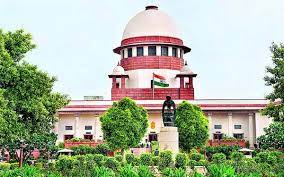The Kerala Government has moved the Supreme Court challenging Governor Arif Mohammed Khan’s decision to reserve seven bills for the consideration of President Droupadi Murmu, asserting that his actions are “manifestly arbitrary.”
In the petition, the Kerala Government seeks to declare the Governor’s act of reserving the seven bills — University Laws (Amendment) (No. 2) Bill, 2021; University Laws (Amendment) Bill, 2021; Kerala Co-operative Societies (Amendment) Bill, 2022; University Laws (Amendment) Bill, 2022; Kerala Lok Ayukta (Amendment) Bill, 2022; University Laws (Amendment) (No. 2) Bill, 2022; and University Laws (Amendment) (No. 3) Bill, 2022 — for the President’s consideration as illegal and lacking in good faith.
“The Governor’s conduct of delaying Bills for extended and indefinite periods, and subsequently reserving them for the President’s consideration without constitutionally relevant reasons, is manifestly arbitrary and contravenes Article 14 of the Constitution.
Furthermore, the assistance and counsel provided by the Union of India to the President to withhold assent from the four bills, which fall entirely within the State’s jurisdiction, without disclosing any reasons, also constitutes manifest arbitrariness and violates Article 14 of the Constitution,” stated the Kerala government.
“Moreover, these actions undermine the rights of the people of Kerala under Article 21 of the Constitution by depriving them of the benefits of welfare legislation enacted by the State Assembly,” it added.
Through advocate CK Sasi, the Kerala Government filed the plea, highlighting that the issue pertains to the Governor’s actions in reserving all seven bills, which he was obligated to address independently, for the President’s consideration, despite none of them concerning Centre-state relations.
“These seven bills had been awaiting the Governor’s attention for nearly two years. The Governor’s action of delaying the bills for such an extended period has disrupted the State legislature’s functioning, rendering it practically ineffective. Among these bills are public interest measures aimed at the common good, yet they have been rendered ineffective due to the Governor’s failure to address each of them ‘as soon as possible’ as stipulated by the proviso to Article 200,” asserted the Kerala Government.
The state government denounced the act as unconstitutional, inherently illegal, lacking in good faith, in violation of the federal structure of the Constitution, and manifestly arbitrary.
The state government further contended that the Governor has frequently criticized the State Government and the Chief Minister in the media, and whether the reservation for the President stems from this or not, referring Bills pending before the Governor for up to two years to the President is a serious dereliction of duty and injustice to the Governor’s constitutional role.
“It is apparent that the Governor was unwilling to allow the Government of Kerala and the State Legislative Assembly to function in accordance with the Constitution and the law under any circumstances,” emphasized the state government.
Previously, the Kerala Government had approached the Supreme Court regarding the Governor’s inaction on pending bills.
The Supreme Court had then strongly objected to the Governor’s actions and remarked that the Governor, subsequent to the initiation of these proceedings, had acted by granting assent to one bill forwarded by the state government, while reserving seven bills for the President’s consideration.
The Supreme Court reasserted its ruling on the Punjab government, stating that the Governor’s authority cannot be employed to stall the legislature’s lawmaking process. On that occasion, the Kerala government had lodged a petition with the Supreme Court against Governor Arif Mohammed Khan for his inaction concerning eight Bills passed by the state legislature and presented to him for assent under Article 200 of the Constitution.

